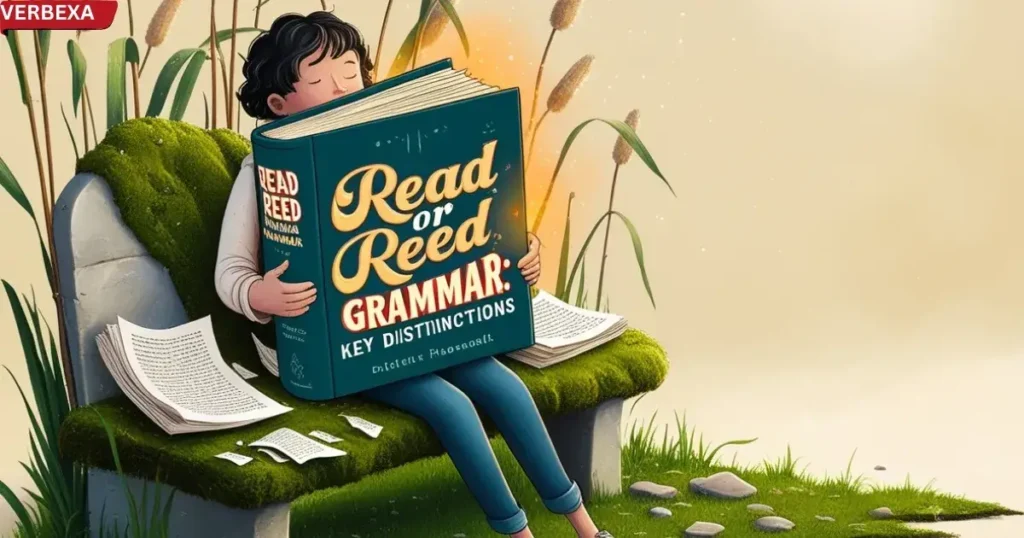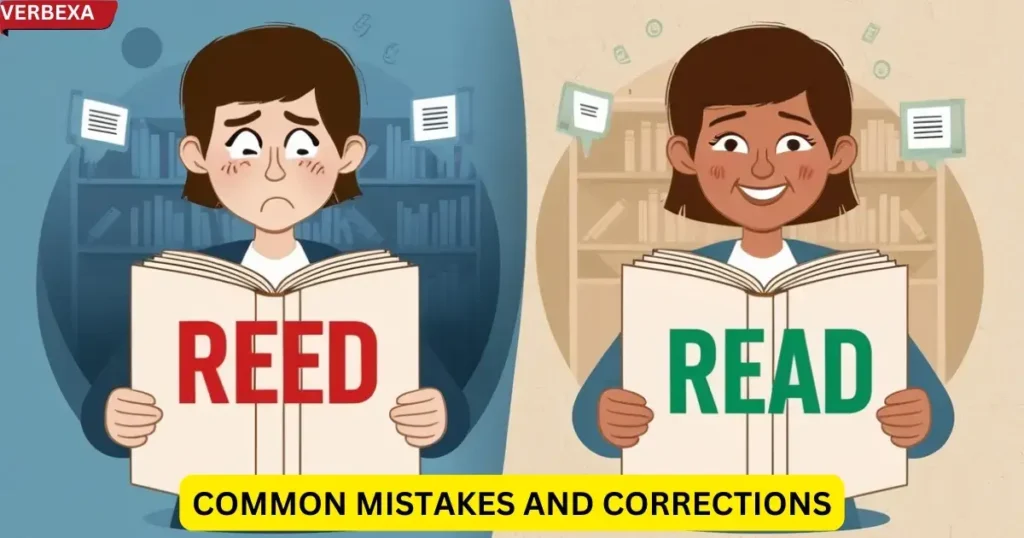The English language is full of homophones – words that sound identical but have different meanings and spellings. One pair that frequently causes confusion is read or reed. This comprehensive guide will help you master the distinction between these commonly confused terms and ensure you’re using them correctly in both written and spoken communication.
Basic Definitions: Read Or Reed Meaning
The terms “read” and “reed” may sound similar, but they have very different meanings and uses in English. To begin our journey of understanding, let’s first define each word.
Read (Verb)
Read is primarily a verb that refers to the act of interpreting written or printed language. What makes this word particularly tricky is that its past tense form is spelled the same but pronounced differently.
- Present tense: read (pronounced as “reed”)
- Past tense: read (pronounced as “red”)
- Present participle: reading
- Example: “I love to read novels before bed.”
Reed (Noun)
A reed is a tall, grass-like plant typically found in wetlands, or a thin piece of wood or cane used in musical instruments like the clarinet or saxophone. Unlike “read,” “reed” maintains consistent pronunciation and is primarily used as a noun.
- Example: “The clarinet uses a reed to produce sound.”
Read Or Reed Grammar: Key Distinctions

Understanding read vs reed requires attention to several grammatical aspects:
Read (Multiple Forms)
- Present tense: “I read the newspaper every morning.”
- Past tense: “I read that book last summer.”
- Future tense: “I will read the document tomorrow.”
Reed (Single Form)
- Noun form: “The duck swam through the reeds.”
- Compound noun: “reed instrument,” “reed bed”
Common Usage: Read Or Reed Examples
Read Usage Examples
- “I love to read classic novels in my spare time.”
- “She read the historical documents carefully.”
- “Are you planning to read that article?”
Reed Usage Examples
- “The musician adjusted the reed on his saxophone.”
- “Tall reeds swayed by the riverbank.”
- “The marsh was filled with golden reeds.”
Comparison Table: Reed vs Read
To further emphasize the differences, let’s compare the key aspects of read or reed in a table format:
| Aspect | Read | Reed |
|---|---|---|
| Part of Speech | Verb | Noun |
| Definition | To interpret written or printed language | A thin, flexible strip used in musical instruments or plants |
| Pronunciation | /rēd/ (present tense), /rɛd/ (past tense) | /rēd/ (same pronunciation as “read” in past tense) |
| Example Sentence | “I read books to improve my knowledge.” | “The reed in my saxophone broke.” |
Synonyms
Read Synonyms
- Peruse
- Study
- Scan
- Browse
- Review
- Interpret
- Examine
- Scrutinize
- Comprehend
- Decipher
Reed Synonyms
- Cane
- Rush
- Sedge
- Bamboo
- Grass
- Stalk
- Stem
- Thatch
- Pipe
- Shoot
When to Use Each Term
Using “Read”
- When discussing the interpretation of written material
- In educational or literacy contexts
- When referring to the act of comprehending text
- In both present and past tense situations
Using “Reed”
- When referring to aquatic plants
- In musical instrument contexts
- When describing wetland vegetation
- In landscaping or environmental discussions
Practical Tips to Avoid Confusion
- Consider the context: Is the topic about reading material or about plants/music?
- Check the grammatical role: Is it functioning as a verb or noun?
- Think about the intended meaning: Are you describing an action (read) or an object (reed)?
Common Mistakes and Corrections

Incorrect Usage:
- “I need to buy a new read for my clarinet.”
- “The duck swam through the reads.”
Correct Usage:
- “I need to buy a new reed for my clarinet.”
- “The duck swam through the reeds.”
Read or Reed Past Tense:
The past tense of read is also spelled read (pronounced “red”). This is where confusion often arises.
Past Tense of “Read” (pronounced “red”):
- “I read the article yesterday.”
Reed and Read Past Tense Confusion:
While reed does not have a past tense form, the word read takes on a new pronunciation in the past tense, which may lead to mix-ups if you’re not paying attention to context.
Conclusion
Understanding the difference between read or reed is essential for clear communication. While they may sound identical in some forms, their meanings and uses are distinctly different. Remember that “read” is primarily a verb related to comprehending text, while “reed” is a noun referring to plants or musical components. By keeping these distinctions in mind and considering the context, you can confidently use these terms correctly in your writing and speech.
Remember that literacy and precise usage of language contribute to effective communication. Whether you’re discussing your favorite classic novels or describing the wetlands habitat, knowing the correct term to use will enhance your language skills and prevent misunderstandings.

This author is a passionate linguist and grammar enthusiast, dedicated to helping individuals master the art of language. With years of experience in teaching and editing, she brings clarity and precision to every sentence. Tina’s mission is to empower writers of all levels to express themselves with confidence and excellence.

